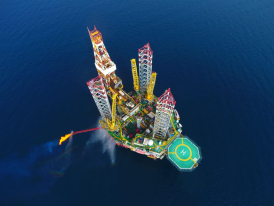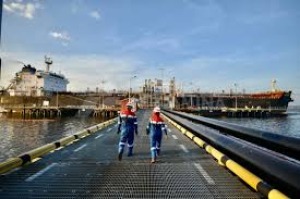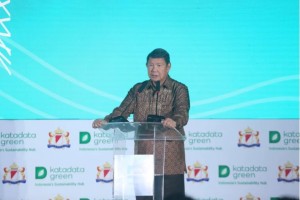I believe responding with positivity, even in tough times, leads to better outcomes
Carole Gall is the President of ExxonMobil Indonesia, a position she has held since January 2023. With nearly three decades at ExxonMobil, she has led operations across Europe, Africa, and North America. Through this interview, Gall has opened up to Indonesia Business Post on her ambition, her challenges in life and her perspective relating to Indonesia's biggest challenges.
Can you tell us a bit about your background and what brought you to your current role in Indonesia?
I'm originally from France and spent the first 20 years of my life there. I started at ExxonMobil as an engineer 30 years ago and gradually moved into supervisory, management, and then leadership roles. Over time, the company gave me the chance to grow and explore different dimensions of our work: technical, financial, strategic, and people-focused. Before coming to Indonesia, I was the President of ExxonMobil in Chad. What I love most is discovering new countries, working with different people, and learning from them. That’s the fun part of what I do.
What brought you exactly to Indonesia, and how has your experience been at ExxonMobil Indonesia?
I was offered the role in Indonesia. My experience leading the business in Africa, particularly in Chad, helped prepare me. The Indonesian business is more complex, but my previous experience provided a strong foundation. This role brings together everything I’ve learned over the years: engineering, geology, finance, strategic planning, and most importantly, developing people.
Are you enjoying your experience so far?
I love Indonesia. Professionally, we’re very active here, and the people are incredibly talented and committed, with a great can-do spirit. On a personal level, the country is stunning. I’ve visited many islands, Papua, Tanah Toraja, Bunaken, Manado, Labuan Bajo, Lombok, Kalimantan. I love scuba diving, hiking, and exploring cultures. Indonesia is both culturally and naturally rich. I feel truly blessed to be here.
In your perspective, what are the biggest challenges that Indonesia is facing?
Indonesia has tremendous growth potential, with a growing, young population and strong economic ambitions, energy demand is rising fast. The challenge is twofold: how to meet that demand while also reducing emissions. We call it the “AND equation” at ExxonMobil: more energy and lower emissions. You can’t choose one over the other. People want affordable energy, and heavy industries like cement or steel don’t run on renewables alone. So, we need a mix: oil, gas, coal, renewables. At the same time, we must tackle emissions. One promising solution is carbon capture and storage. Indonesia has really good geology, rocks that can store emissions safely underground. You can take emissions from petrochemical plants, steel or cement factories, and store them in these rocks. That’s how you grow the economy and protect the climate. Indonesia is well positioned to do both, and I’m optimistic.
Given these challenges, how do you envision Indonesia’s development by 2030, and what role do you see ExxonMobil playing in supporting that transformation?
I think the next decade will be critical for Indonesia. The country must support existing energy providers to keep fueling growth, while also accelerating the energy transition. It’s the “AND equation”, we need oil, gas, coal, and renewables, all at once, because the population is growing and lifestyles are improving. More people entering the middle class means more demand for cars, homes, air conditioning, which means more energy. And so for me, the next 10 years are critical because this is when you can start seeing both sides working side by side. I’m optimistic, but also very curious to see how this transformation will unfold. ExxonMobil is contributing on both fronts: we produce fuels, lubricants, chemicals, and we’re also advancing carbon capture and storage. I’m proud of what we do, we power progress while helping reduce emissions.
How many people work for ExxonMobil in Indonesia, and where are they mostly based? Do you visit them often?
We have about 700 to 800 people in Indonesia, and most of them are in the field. Our operations span oil and gas, as well as lubricants and fuels, a mix of energy production and energy products. A large portion of our field team is in Cepu, Bojonegoro, right in the heart of the community, and it’s truly a beautiful operation. I try to visit them every month, it’s not always possible, but I make an effort because I enjoy it.
What is the next major step for ExxonMobil in Indonesia, and how does it align with your environmental goals?
We're exploring a potential world-class petrochemical investment in Indonesia, which would be paired with carbon capture and storage (CCS) technology. Since petrochemical plants can generate emissions, we're committed to integrating CCS from the start to prevent those emissions from entering the atmosphere. It’s not something we do in many countries, so it would be quite special. While it's still early days and there's a long way to go, we're excited about the opportunity. It's an important first step that supports both industrial growth and our low-carbon ambitions.
What kind of strategic partnerships or collaborations is ExxonMobil currently pursuing in Indonesia, and how do they align with your broader goals?
Collaboration is at the heart of everything, two key stakeholders are essential: the local communities and the government. In places like Bojonegoro, where we operate, we've built strong relationships through programs, job creation, and local talent development. We also offer training, invite schools to learn about career opportunities, and empower women through entrepreneurship programs. One example I'm proud of is a crochet business started by local women that's now exporting globally. Our presence contributes significantly to the economy, just from our oil and gas operations, we've contributed around $30 billion in revenue to Indonesia, helping improve infrastructure and education. Equally important is our partnership with the government. Everything we do must align with national priorities, and we actively engage with regulators and ministries. Additionally, we collaborate closely with the broader industry; I personally serve as the president of the petroleum industry association, where we work together to help meet Indonesia’s energy needs.
What's the future really of oil and gas? What do you think?
Oil and gas will remain critical for decades to come. If you look at any credible global forecast, whether from companies, NGOs, or research institutions, they all agree that oil and gas will still play a key role in the energy mix by 2050. Yes, renewables are growing, and that's great, but energy demand is also rising with population and development. We believe the real challenge isn't choosing between energy sources, but reducing emissions across the board. That’s where technologies like carbon capture and storage come in. We need all forms of energy to meet global demand, it's not an “either/or,” it's an “AND.” We need to balance the energy transition with providing reliable, affordable energy for growing economies like Indonesia’s.
What advice would you give to foreign leaders or companies looking to invest or set up operations in Indonesia?
Indonesia is a fantastic place to do business, full of opportunity, and driven by talented, passionate, and resourceful people. Relationships and cultural understanding are key. You can't expect to apply the same approach you use elsewhere, whether in Africa, Europe, or anywhere else. There's no universal "right way" to do business; the right way is the one that respects and adapts to the local context. The people here are a pleasure to work with, full of passion and resourcefulness, always finding ways to make things work. If you learn the culture, respect it, and adapt to it, you'll find Indonesia not only professionally rewarding but personally enriching as well.
What has been the most rewarding experience of your career so far?
The most rewarding experience has been discovering different cultures and learning from them. Over 30 years and many countries, I've seen greatness everywhere, from the positivity in Chad to the resourcefulness in every culture. Observing and learning from these experiences has made me a better person.
What's one topic that you're deeply passionate about?
Generally speaking, I'm very passionate about making the world better. I mean that's what drives me while I've been working for ExxonMobil for 30 years. It makes the world better by providing energy; by helping society and the community where we operate; the revenue we generate for the government; I'm very passionate about making the world better… and also of course cultures! Don't get me started on how beautiful Indonesia is. I can speak for hours about Papua, Sulawesi, Labuan Bajo, Lombok, Kalimantan. I'm very passionate as a person. I get really into my beliefs, I'm sure you've sensed a little bit of that already.
Who has been your biggest influence so far?
I have many mentors and learn from observing people around me, especially those who teach me about local culture. But if I had to name one, it would be my parents. They instilled the values that have stayed with me throughout my life.
What core values guide you in your professional and personal life?
Integrity is fundamental in both my personal and professional life. Honesty and courage of conviction; speaking up when something’s not working, are crucial to me. I believe you can only fix what you’re aware of.
I also come from humble beginnings. My mother didn’t work and took care of us, while my father worked as a welder in shipyards. My parents weren’t wealthy or in the oil and gas industry, but they taught me that the job you have or the wealth you possess doesn’t mean you’re a better person, because I’ve seen outstanding people like my parents, without all of that. It’s the values you live by: courage of conviction, care, respect, and integrity, that matter most.
Do you believe in destiny, or do you think success is fully driven by choice, effort, and no coincidence?
I love that question, and you're the first person to ask me that. For me, success means happiness.
So, when people ask me what a successful career is or if I'm successful as a president, I answer, "What you're really asking is, am I happy? Am I happy with my career? Am I happy being a president?" The answer to that is yes. Success, for me, is about happiness.
It’s not about a job title; it’s about waking up with a smile and being excited for the day ahead. I believe we have the power to drive our own happiness, even though destiny sometimes throws roadblocks our way. Life will bring challenges, something happens to your home or a loved one, and it can feel like the world is falling apart. But ultimately, we have control over how we respond to those challenges.
And so, I do believe we have a role to play in our success, which means for me, we have a role to play in being happy. But every now and then, there are things beyond our control, whether it’s an issue at home or something involving a family member or loved one. It may feel like the world is falling apart at that moment, but ultimately, you get back on your feet, make decisions, and drive your own happiness.
You can't always control what happens to you, but you can control your reaction. I believe responding with positivity, even in tough times, leads to better outcomes. If something bad happens, I aim to react positively, even if I’m not happy or I’m sad. Responding with a positive mindset helps lead to better things.
So, while destiny plays a part, I believe success is primarily something we drive ourselves.
Tag
Already have an account? Sign In
-
Start reading
Freemium
-
Monthly Subscription
20% OFF$29.75
$37.19/MonthCancel anytime
This offer is open to all new subscribers!
Subscribe now -
Yearly Subscription
33% OFF$228.13
$340.5/YearCancel anytime
This offer is open to all new subscribers!
Subscribe now







